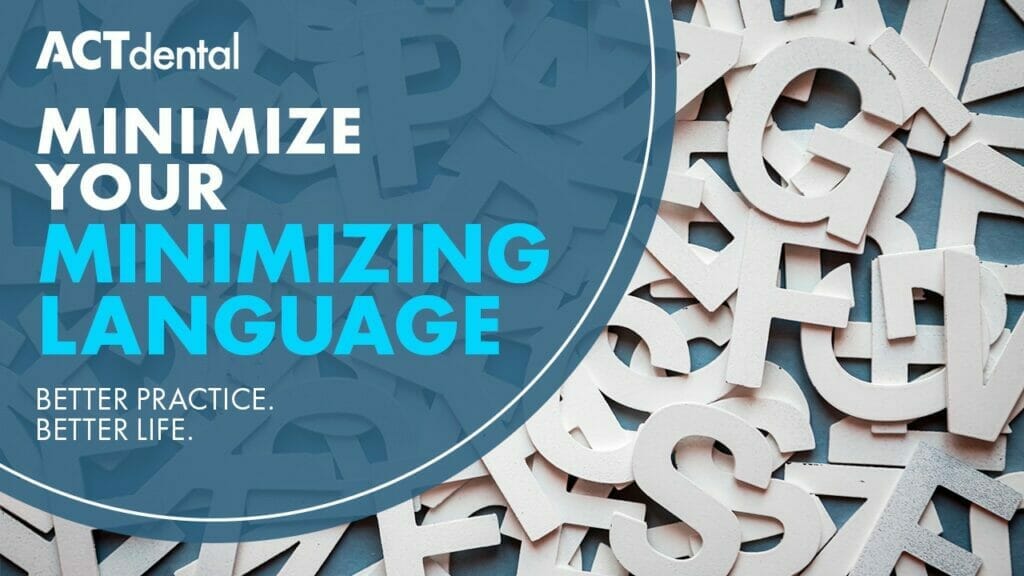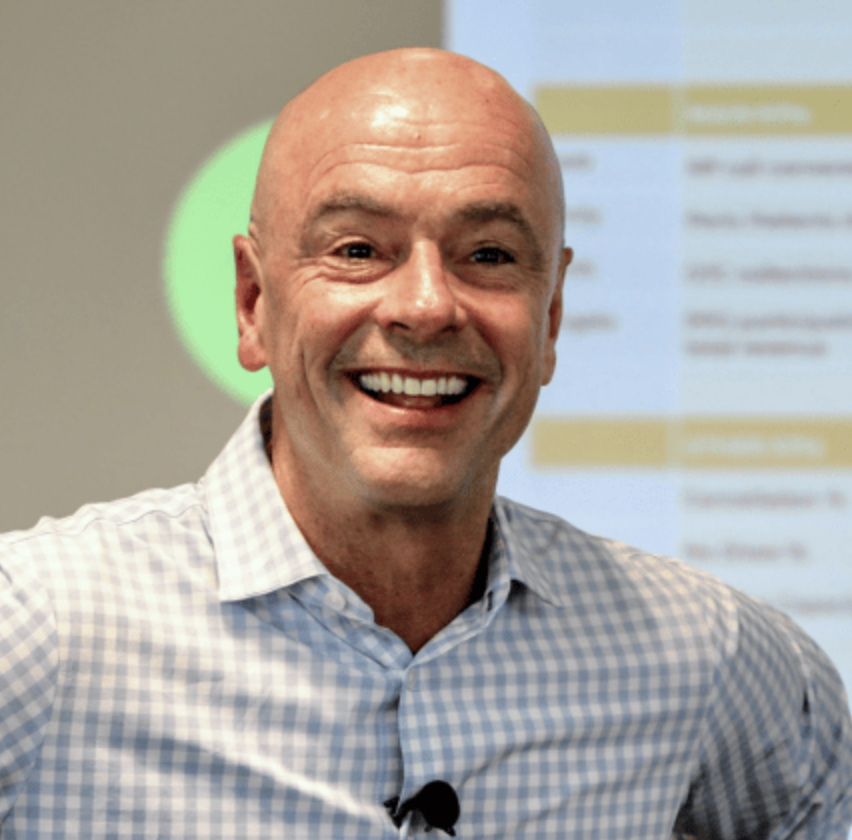We’ve all said or heard someone else say it before: “It’s just a little bleeding,” “You have a little cavity,” or “Looks like you’ve got some decay.” Sometimes it feels like this kind of language is ingrained in us, but the truth is it minimizes what we do, and we need to remove it from our vocabulary. We need to get intentional with our words because otherwise, patients will never take treatment seriously.
Cut it Out
As Angela puts it, minimizing language is any word or phrase you use that makes what you’re doing, what you’re seeing, or what someone is experiencing less than what it actually is. It may sound overly simple, but you need to eliminate those minimizing words from your vocabulary. They don’t have a little bleeding—they have bleeding. Get rid of a little. Another method that one of our coaches, Courtney, recommends to her clients is to use action words to impart to their patients that this is something that hasn’t happened—it’s happening. For example, instead of “Your tooth has decay,” try “Your tooth is decaying.” It’s easier for the patient to understand the severity of the issue if they see it as something that’s actively happening.
Listen to Your Language
How do you make the change to get rid of minimizing language? Christina recommends starting by listening to yourselves to learn what habits your team has. One of Heather’s teams has a unique method for this: the minimizing language jar. Every time someone uses minimizing language, their name goes in a jar, and then at their team meeting, they pull the names out and discuss the situation and how to improve it. Each week there are fewer and fewer names in the jar, so it’s clearly working for them. It’s incredibly helpful when you work together as a team because then there’s accountability.
It’s also great to use roleplaying exercises to practice interacting with patients both in the operatory and the front desk because it allows you to make mistakes and learn in a safe environment. The more you practice, the more progress you’ll make because your brain will acquire the muscle memory of having these conversations. When it’s game time and you’re with the patient, you’ll remember that you’ve already had this conversation and know what mistakes to avoid.
Start small because you’re not going to magically stop saying the word “little” overnight. Have team meetings, talk about the desired mindset shift, bring up the challenges, and explain why it’s important to do it. In the end, this is about the patient’s health, because they need to understand what’s going on in their mouths so we can get them closer to being healthy.
Make it a Habit
It’s difficult to change your language, so after going through the effort to do so, you’ll want to make sure that it sticks. Like Kirk often says, “If it’s not in writing, it doesn’t exist,” so create a written document of the right way to say things. We recommend using ACT’s free Say This, Not That tool, because not only does it already have great examples of effective language, but it also has a section you can customize to add your own practice-specific examples. Your entire team must be calibrated around this new language because you can’t have a patient hear one thing from the clinical team and then immediately hear minimizing language from the admin team. When you’ve documented it, however, it’s incredibly easy to get everyone aligned around it. What’s more, your document becomes a training tool for any new team members that come aboard, making sure they’re learning the proper verbal skills right from the start.
Language matters, and the more intentional you get with it, the better you’ll be able to help your patients. It transforms the patient’s experience when you get rid of your minimizing language. They’re able to understand better the true significance of their problem and the necessity of the treatment you’re offering.
Reach out to us, and we’ll bring in some help and make things fun. The more familiar your team gets with using this new language, the more their collective confidence in their verbal skills will grow. Patients can feel that confidence and they like it, you’ll see your treatment plan acceptance numbers go up and your schedule gets full as you build a Better Practice, and a Better Life.
Christina Byrne is the Director of Operations at ACT Dental
Heather Crockett is a Lead Practice Coach at ACT Dental
Angela Heathman is a Lead Practice Coach at ACT Dental
Kirk Behrendt
Kirk Behrendt is a renowned consultant and speaker in the dental industry, known for his expertise in helping dentists create better practices and better lives. With over 30 years of experience in the field, Kirk has dedicated his professional life to optimizing the best systems and practices in dentistry. Kirk has been a featured speaker at every major dental meeting in the United States. His company, ACT Dental, has consistently been ranked as one of the top dental consultants in Dentistry Today's annual rankings for the past 10 years. In addition, ACT Dental was named one of the fastest-growing companies in the United States by Inc Magazine, appearing on their Inc 5000 list. Kirk's motivational skills are widely recognized in the dental industry. Dr. Peter Dawson of The Dawson Academy has referred to Kirk as "THE best motivator I have ever heard." Kirk has also assembled a trusted team of advisor experts who work with dentists to customize individual solutions that meet their unique needs. When he's not motivating dentists and their teams, Kirk enjoys coaching his children's sports teams and spending time with his amazing wife, Sarah, and their four children, Kinzie, Lily, Zoe, and Bo.
RECENT POSTS
876: The Kois-Coachman Digital Dentistry Event & The IntraOral Scanner Festival – Dr. Christian Coachman
April 18, 2025
Rest Isn't A Reward, It's A Requirement!
April 14, 2025
Data Snapshot: # of Office Days Open
April 11, 2025
Weather Any Storm: The Power of Focus
April 07, 2025
871: Metric Mondays: Gross Profit Percentage: The Health Indicator of Your Practice – Dr. Barrett Straub
April 07, 2025
Embrace Conflict to Unlock Trust
April 04, 2025

